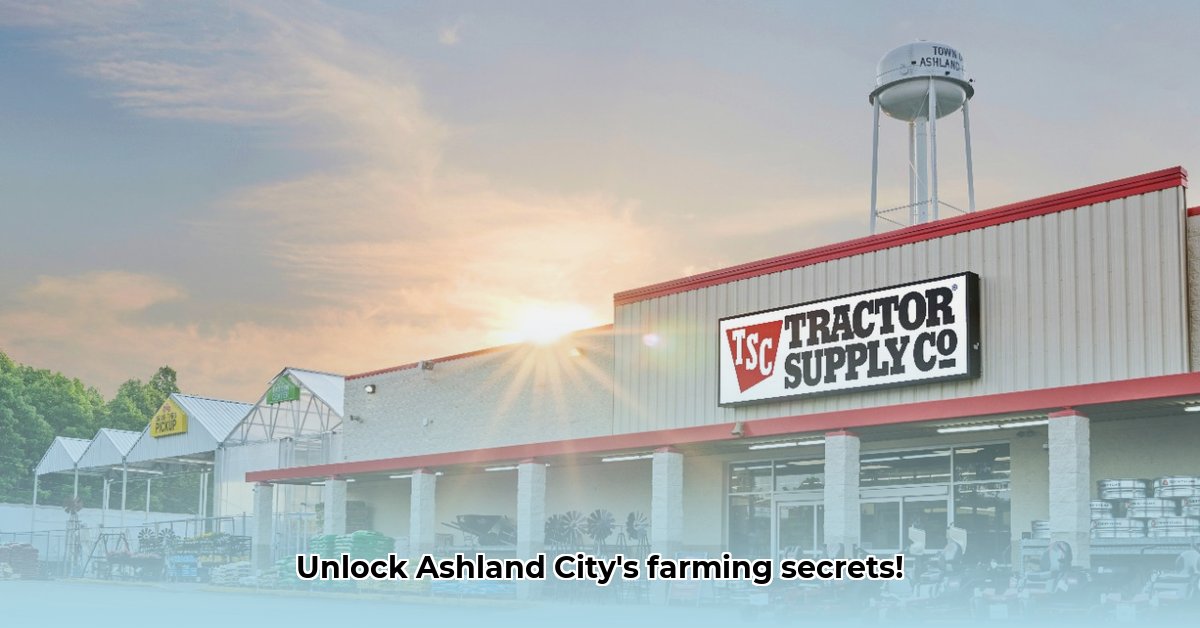
Tractor Supply Ashland City Tennessee: A Community's Stake in Sustainable Farming
Tractor Supply Company (TSC) in Ashland City, Tennessee, plays a significant role in the local agricultural landscape. However, the extent of its contribution to sustainable agriculture is a complex issue demanding investigation. This article explores both the positive and negative aspects of TSC's influence, analyzing its product offerings, challenges to measuring sustainability, key stakeholders, and potential pathways toward improvement. For another example of TSC's impact, see this Tennessee location.
TSC's Product Offerings: A Critical Examination
TSC's extensive inventory, ranging from animal feed to seeds and tools, includes products that could support sustainable agriculture. The availability of organic seeds and fertilizers suggests a potential commitment to eco-friendly practices. However, the lack of transparent data regarding sales figures for sustainable products, sourcing practices, and supplier sustainability criteria hinders a definitive assessment. Crucially, information about the impact of recent store closures (or temporary suspensions) on the local farming community remains unavailable. This absence of readily accessible information undermines the ability to fully evaluate TSC's environmental impact.
The Challenges of Measuring Sustainability: Quantifying the Impact
Assessing TSC's true commitment to sustainability presents significant difficulties due to a lack of detailed public information. The mere presence of organic products on shelves doesn't fully reflect the company's overall sustainability practices. Critical questions remain unanswered: Does TSC track the environmental footprint of its products across its supply chain? Does it prioritize suppliers employing sustainable harvesting methods (e.g., for lumber)? The absence of a comprehensive Corporate Social Responsibility (CSR) report, providing a detailed accounting of its environmental and social impact, significantly limits our understanding of TSC's contribution.
Key Stakeholders: A Multifaceted Perspective
Several groups possess a vested interest in TSC's role in sustainable agriculture:
Tractor Supply Company Management: Accountability rests with TSC's management to provide transparent and detailed information on its sustainability initiatives, and the impact of store closures on local communities. This transparency is essential for building trust and demonstrating commitment.
Local Farmers and Gardeners: These individuals rely heavily on TSC for essential supplies and must make informed purchasing decisions, carefully considering sustainability claims. Their active engagement ensures TSC's responsiveness to community needs.
Investors: The growing influence of Environmental, Social, and Governance (ESG) factors in investment decisions necessitates that TSC's commitment to sustainability become a key metric. Investors' scrutiny directly impacts the company's long-term viability.
Environmental Non-Governmental Organizations (NGOs): These organizations act as vital watchdogs, holding companies accountable for their environmental claims. Their active engagement, including potential independent audits, is crucial for driving positive change.
Assessing the Risks and Potential Mitigation Strategies
TSC faces several interconnected risks that could impede its sustainability efforts:
| Risk Factor | Likelihood | Potential Impact | Mitigation Strategies |
|---|---|---|---|
| Store Closures | Moderate | Significant negative impact on local farmers | Optimize store locations based on detailed market analysis; expand online sales and delivery; invest in operational efficiencies. |
| Lack of Transparency on Sustainability | High | Reputational damage and reduced customer loyalty | Publish detailed sustainability reports with third-party verification; proactively engage stakeholders. |
| Increased Competition | High | Loss of market share | Develop unique, sustainable product offerings; strengthen customer loyalty through superior service. |
| Supply Chain Disruptions | Moderate | Product shortages and increased costs | Diversify sourcing, build resilient supply chain relationships focused on sustainability and reliability; proactively manage potential disruptions. |
How to Source Sustainable Farming Supplies at Tractor Supply
Navigating Tractor Supply's offerings to find sustainable farming supplies requires careful evaluation. While TSC offers various products that can support environmentally conscious practices, discerning consumers must exercise due diligence.
Evaluating TSC's Organic Offerings: A Critical Approach
While TSC's commitment to offering organic gardening supplies is noteworthy, consumers must not assume all claims are accurate.
- Scrutinize Certifications: Do not assume “organic” claims without verification. Look for reputable organic certifications that meet stringent standards.
- Assess Packaging: Consider the environmental impact of packaging materials. Prioritize recycled or biodegradable options.
- Investigate Sourcing: Support local businesses and suppliers who demonstrate robust sustainable practices.
- Utilize Online Resources: Supplement in-store research with online reviews to assess product performance and claims.
Beyond Organic: Expanding the Search for Sustainable Options
Sustainable agriculture encompasses practices beyond organic certification. TSC's broader offerings include some elements that can contribute to a more sustainable approach.
- Water Conservation Tools: Efficient irrigation systems are vital. Explore TSC’s drip irrigation and water management systems.
- Soil Health Products: Healthy soil is crucial. Use TSC’s soil tests, compost, and natural fertilizers to improve soil quality.
- Pest Control Alternatives: Consider integrated pest management (IPM) strategies, using natural pest repellents and beneficial insect introductions (where available).
- Renewable Energy Options: If available, inquire about solar-powered equipment suitable for smaller farms.
Navigating the Challenges: Informed Consumerism
Even with TSC's offerings, finding truly sustainable products requires careful consideration. Consumers must be mindful of potential misleading labeling and price discrepancies between organic and conventional options.
A Step-by-Step Guide to Sustainable Sourcing at TSC
Define Your Needs: Clearly identify your specific requirements for sustainable farming supplies.
Utilize TSC's Online Resources: Thoroughly search TSC's website, filtering by “organic” or related keywords, and verifying certifications.
Visit Your Local Store: Examine products in person, check labels, and inquire about sourcing and sustainability initiatives with store personnel.
Compare and Contrast: Research and compare available products to ensure you receive optimal value for your investment.
Informed Decisions: Base your purchasing decisions on your specific needs and values, prioritizing sustainability.